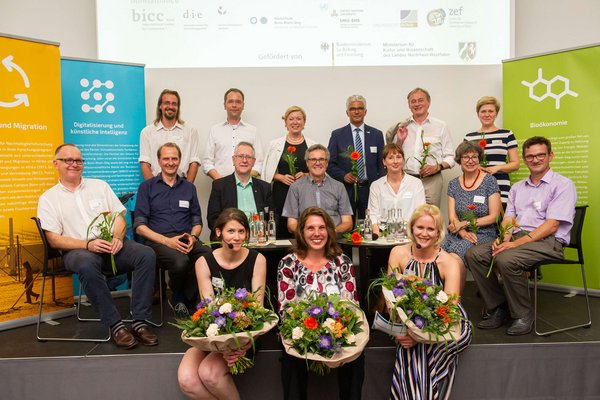- Share this article
- Subscribe to our newsletter
Innovation Campus Bonn to address key sustainability issues
During the COP23 World Climate Summit, held in Bonn, Germany in November 2017, the United Nations University Institute for Environment and Human Security (UNU-EHS), “Hochschule Bonn-Rhein-Sieg”, the German Development Institute (DIE), the Bonn International Center for Conversion (BICC) and the University of Bonn with its Center for Development Research (ZEF) joined forces to establish the Bonn Alliance for Sustainability Research. The aim of the Alliance is to concentrate research expertise in the field of sustainability research. It has conceived the Innovation Campus Bonn (ICB) to perform the threefold mission of research, teaching, and communication and policy advice concerning sustainability. Research is to initially concentrate on three key areas.
Research in the area of “Digitisation and Artificial Intelligence” focuses on the impact that these two fields will be having on implementing the 2030 Agenda and the Paris Climate Agreement. Activities are already in progress in this area, with the Scientific Advisory Council to the German Government (WBGU) and the DIE collaborating with the University of Bonn.
New technologies such as 3D printer systems and intelligent automation could lead to a relocation of industries undermining or potentially increasing the competitive advantages of developing countries. While digitisation and artificial intelligence could boost circulation-oriented activity, they may also have a detrimental impact on the planet’s research budget. These are examples of developments the ICB will be looking at in this area.
The second area, “Mobility and Migration”, is being addressed by the ICB institutions in a wide range of programmes that are looking at aspects such as refugee movements, conflicts of climate change and what other impacts of climate change are like. Among the key challenges that the ICB seeks to look at in this area is the issue of inclusion, with local communities often feeling insecure and threatened by changes in social and spatial mobility.
Bonn University’s Faculties of Agriculture and of Mathematics and Science are cooperating with ZEF and the nearby Jülich Research Center to address “Bioeconomics”, the ICB’s third focal area of activities. Germany already launched a “National Strategy Bioeconomics” in 2010, and the recommendations of the German Federal Government’s HiTech Forum 2017 referred to bioeconomics as one of the six most important topics of the future. The ICB seeks to provide an international platform in this field that will ensure a continuous and open dialogue between scientists, politicians, the private sector and the public at large on opportunities and risks and also on how such issues can be evaluated and assessed.
Research and education
The ICB plans to run international Bachelor of Arts, Master of Arts and PhD programmes on the subject of sustainability research, a particular feature of which will be the Bonn Advanced School of Innovation and Development (BASIS). This new institution is to be run by the University of Bonn, and it shall provide programmes addressing areas such as institutional innovation and politics, industry and organisations, innovation for sustainable management and use of natural resources, as well as technological innovation and digitisation. BASIS will be coordinated across different faculties and act as a basis for already existing doctoral programmes in Bonn.
The ICB’s Scientific Director, Jakob Rhyner, Professor for Global Change and Systemic Risks at Bonn University’s Faculty of Agriculture, believes that Bonn itself, as the ICB’s host city, can play a special role as “a sounding board to assess just how useful new ideas are”. Bonn’s Lord Mayor Ashok Sridahan launched the city’s “Sustainability Strategy” earlier on this year, a key element of which is to reduce the percentage of car traffic in the city centre and encourage cycling instead. But the ICB is to have a much wider political outreach, and its member institutions see it as well-placed in this respect, with the UN’s facilities already acting as a “sustainability hub”.
Mike Gardner, journalist, Bonn/Germany
More information:
Website of the Bonn Alliance





Add a comment
Be the First to Comment